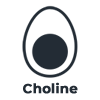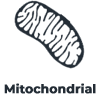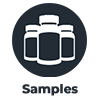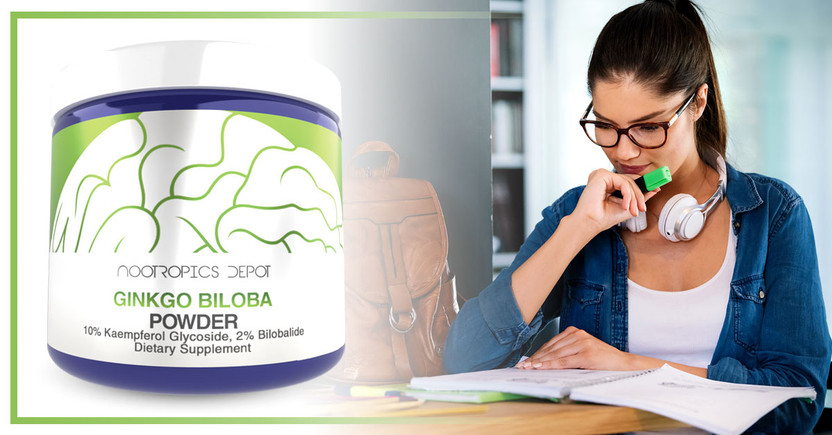The Top 5 Benefits of Ginkgo Biloba
Posted by Nootropics Depot on 14th Oct 2021
What is Ginkgo Biloba?
Ginkgo Biloba is a species of tree that is commonly referred to as the “Maidenhair tree”. Ginkgo Biloba trees are incredibly resilient, so much so, that some Ginkgo trees were even known to survive high levels of radiation! Due to their resilience to various environmental stressors, it is no surprise that Ginkgo trees are one of the oldest living species of tree that we know of today!
Traditionally, Ginkgo Biloba was used in Chinese practices where it was used for its blood flow benefits. Modern research has now confirmed these effects, and the effects are indeed quite significant!
There are so many parts of the body that benefit from Ginkgo Biloba! While Ginkgo is mostly known for its benefits to cardiovascular and cognitive function, it also supports skin health, auditory function and physical endurance. Most of these benefits may be traced back to the compounds discussed below. Keep reading to find out how these compounds accomplish such amazing things!
What Bioactive Compounds Does Ginkgo Biloba Contain?
The two main classes of active compounds in Ginkgo Biloba are flavone glycosides and terpene lactones. In general flavone glycosides help to balance inflammation levels and terpene lactones help support overall brain function. This is why we chose to standardize to bilobalide (a terpene lactone) and kaempferol (a flavone glycoside)! Our Ginkgo biloba is standardized to 10% Kaempferol Glycosides + 2% Bilobalide to fully support some of Ginkgo’s cognition and brain health promoting effects!
What is Ginkgo Biloba?
Ginkgo Biloba is a species of tree that is commonly referred to as the “Maidenhair tree”. Ginkgo Biloba trees are incredibly resilient, so much so, that some Ginkgo trees were even known to survive high levels of radiation! Due to their resilience to various environmental stressors, it is no surprise that Ginkgo trees are one of the oldest living species of tree that we know of today!
Traditionally, Ginkgo Biloba was used in Chinese practices where it was used for its blood flow benefits. Modern research has now confirmed these effects, and the effects are indeed quite significant!
There are so many parts of the body that benefit from Ginkgo Biloba! While Ginkgo is mostly known for its benefits to cardiovascular and cognitive function, it also supports skin health, auditory function and physical endurance. Most of these benefits may be traced back to the compounds discussed below. Keep reading to find out how these compounds accomplish such amazing things!
What is Ginkgo Biloba?
Ginkgo Biloba is a species of tree that is commonly referred to as the “Maidenhair tree”. Ginkgo Biloba trees are incredibly resilient, so much so, that some Ginkgo trees were even known to survive high levels of radiation! Due to their resilience to various environmental stressors, it is no surprise that Ginkgo trees are one of the oldest living species of tree that we know of today!
Traditionally, Ginkgo Biloba was used in Chinese practices where it was used for its blood flow benefits. Modern research has now confirmed these effects, and the effects are indeed quite significant!
There are so many parts of the body that benefit from Ginkgo Biloba! While Ginkgo is mostly known for its benefits to cardiovascular and cognitive function, it also supports skin health, auditory function and physical endurance. Most of these benefits may be traced back to the compounds discussed below. Keep reading to find out how these compounds accomplish such amazing things!
What Bioactive Compounds Does Ginkgo Biloba Contain?
The two main classes of active compounds in Ginkgo biloba are flavone glycosides and terpene lactones. In general flavone glycosides help to balance inflammation levels and terpene lactones help support overall brain function. This is why we chose to standardize to bilobalide (a terpene lactone) and kaempferol (a flavone glycoside)! Our Ginkgo biloba is standardized to 10% Kaempferol Glycosides + 2% Bilobalide to fully support some of Ginkgo’s cognition and brain health promoting effects!
What Bioactive Compounds Does Ginkgo Biloba Contain?
The two main classes of active compounds in Ginkgo biloba are flavone glycosides and terpene lactones. In general flavone glycosides help to balance inflammation levels and terpene lactones help support overall brain function. This is why we chose to standardize to bilobalide (a terpene lactone) and kaempferol (a flavone glycoside)! Our Ginkgo biloba is standardized to 10% Kaempferol Glycosides + 2% Bilobalide to fully support some of Ginkgo’s cognition and brain health promoting effects!
Why Choose Bilobalide and Kaempferol?
To start off, bilobalide has very unique effects that help to support cognitive function. One of the most interesting mechanisms by which it does this is by selectively inhibiting GABA subunits that do not affect relaxation but do play a crucial role in memory!
The second major component, kaempferol, can be found in low concentrations in select vegetables. Within the context of regular vegetable consumption, kaempferol doesn’t have very pronounced effects, however at an impressive 10% in our Ginkgo Biloba extract, it certainly does! One of the main benefits of kaempferol is that it helps balance inflammation levels. Furthermore, kaempferol may be neuroprotective, which is a very desirable effect that we often try to select for with natural nootropics!
Now that you know what our Ginkgo Biloba extract is standardized for, let's dive into the main benefits that it provides!
Ginkgo Biloba Helps Support Memory
Gingko Biloba stands out from other memory supplements because it appears to work via GABAergic signaling. GABA-A receptors are composed of many different subunits that come together to create a full GABA-A receptor and when we target specific GABA-A receptor subunits, such as a1 and a5, we may help promote memory! Specifically, we are talking about blocking GABAergic signaling, which may raise some red flags for some, as we often want to promote GABAergic activity in order to help promote relaxation. While it is true that blocking whole GABA-A receptors is highly undesirable in general, once we break it down into each individual subunit that makes up the GABA-A receptor, the picture becomes a little bit clearer. Allow us to demonstrate by taking a look at only the alpha subunits for simplicity sake:
GABA-A receptor subunits (alpha types)
-
-
- a1: Activation of these subunits produce calming and muscle relaxing effects. However, this comes at the major expense of diminished memory function. Blocking this subunit on the other hand, will do the opposite, and this leads to a memory promoting effect.
-
-
-
- a2: Activation of these subunits produce a calming effect with no effects on memory.
-
-
-
- a3: Activation of these subunits produce a calming effect with no effects on memory.
-
-
-
- a4: Activation of these subunits play a large role in the reward/pleasure pathways in our brains.
-
-
-
- a5: Similar to activation of a1, activation of these subunits produce calming and muscle relaxing effects. However, this also comes at the major expense of diminished memory function. Blocking this subunit, just like with a1, will do the opposite, and this also leads to a memory promoting effect.
-
-
-
- a6: Activation of these subunits produces a calming effect with minimal impact on memory at low activation levels. At high activation levels, a6 subunit activation may negatively impact explicit memory without affecting implicit memory.
-
As can be seen from the list above, generally blocking GABA-A receptors is obviously not a great idea, and so we have to be highly selective in how we block various GABA subunits in order to achieve a memory promoting effect without affecting relaxation, stress and mood. To accomplish this, Ginkgo Biloba needs to specifically antagonize just the GABA-A subunits that control memory without antagonizing the GABA-A subunits responsible for relaxation. Luckily, this is exactly what Ginkgo does!
Ginkgo Biloba may promote memory by antagonizing a1 subunits. As we displayed in the list of subunits and effects above, when activated, a1 units have a negative impact on memory and thus blocking a1 should have a positive effect on memory. While no direct research appears to have been done on selectively blocking a1 subunits, there have been some studies that have shown that blocking a5 subunits has significant effects on promoting memory. It has, however, been proven that a1 subunits control procedural memory. Based on this, we could make the conclusion that inhibiting a1 subunits with bilobalide may promote procedural memory function. This also raises an interesting point, that bilobalide is perhaps one of the only selective a1 subunit antagonists, which is quite an exciting prospect within the context of memory promotion!
That all being said, GABA isn’t the only way that Ginkgo Biloba promotes memory! Ginkgo Biloba also regulates norepinephrine transporters which helps promote norepinephrine and other catecholamine levels in the brain, specifically in the prefrontal cortex. Norepinephrine plays a major role in memory function, and when combined with other catecholamines in the prefrontal cortex, may also helps promote executive function!
Furthermore, Ginkgo Biloba also likely promotes memory via promoting neurogenesis. Memory is actually a real physical change in the brain and neurogenesis helps facilitate this process. Neurogenesis may be a result of the other memory effects mentioned above plus additional support to brain derived neurotrophic factor (BDNF). Overall, Ginkgo Biloba is clearly a heavy hitter when it comes to memory function so it is no surprise that it is one of the most popular natural nootropic supplements available to buy!
Ginkgo Biloba Supports Blood Flow
One of the most well known aspects of Ginkgo Biloba is its benefit to blood flow. Ginkgo Biloba promotes blood flow primarily through endothelial nitric oxide synthase (eNOS), an enzyme which produces nitric oxide in the walls of blood vessels. Nitric oxide binds with various receptors in the blood vessels walls which then causes a relaxation of the blood vessel walls to support blood flow. This process is called vasodilation. Ginkgo Biloba also helps to promote the number of eNOS enzymes to expand its own range when it activates eNOS.
While we know that Ginkgo Biloba supports blood flow, we still need to figure out why this is important and how it affects our daily lives. Blood is the main carrier of nutrients, neurotransmitters, hormones and oxygen; making it incredibly important to ensure that the body is getting proper blood flow. Healthy levels of blood flow within the brain may promote the function of cells and neurons while also promoting cognitive function and memory. Some studies have shown that deficiencies in eNOS enzymes and eNOS functions may not support cognitive function, so it is very unique that Ginkgo Biloba is able to promote both cardiovascular and cognitive function by supporting overall eNOS activity. With such a targeted effect on blood flow, Ginkgo Biloba's popularity is no surprise!
Ginkgo Biloba Promotes Auditory Health
Hearing plays a big part in our lives without us fully realizing it sometimes. Whether it’s waking up to your alarm in the morning, jamming out to music as you drive to work (or walking the four steps from bed to desk), or listening to your friends talk; there is a lot that we listen to each day. Even outside of how important hearing is in general, a decline in auditory function can sometimes even be connected to a dip in emotional wellbeing and a consistent sleep schedule. It’s important to take care of our hearing so that it functions properly. With this in mind, Ginkgo Biloba may be a great choice to support auditory health in addition to its other benefits!
Ginkgo Biloba may help protect auditory health via modulating the function of platelet activating factor (PAF). Specifically, it appears that the effect of Ginkgo Biloba on auditory health is related to the interaction between PAF and inducible nitric oxide (iNOS) in the cochlea. In studies on PAF, it was found that activation of PAF within the cochlea could induce hearing damage, and that this hearing damage was mitigated significantly by blocking iNOS. Interestingly, it has also been found that Ginkgo Biloba not only blocks PAF activity but it also lowers iNOS activity. Taken together, this indicates that PAF activation likely mediates hearing damage through iNOS. What this means is that Ginkgo Biloba may be a great option for helping to promote auditory health since it has been shown to block PAF and iNOS activity!
"Research has shown that magnesium levels are decreasing in most foods... With the magnesium content decreasing in crops and the increase in the consumption of processed foods, magnesium deficiencies in the population are becoming more prevalent."
Ginkgo Biloba Supports Skin Health
Ginkgo Biloba has a wide range of effects that makes it stand out from other supplements. One of those amazing benefits is promoting skin health! To support skin health, Ginkgo Biloba can be taken either internally or applied topically.
When applied topically, Ginkgo Biloba can be used to directly support the skin by helping to primarily promote skin moisture content. Furthermore, Ginkgo Biloba may also help promote melanocyte function while providing a direct effect on oxidative stress. Taken together, these effects help promote skin health while also potentially helping to protect the skin from environmental stressors such as UV radiation.
When taken internally, Ginkgo Biloba will still be able to promote skin health in addition to its other benefits. It is available in powder form to help you select the method of consumption that is most convenient. If you would like to try it out topically, we have developed and tested a very simple moisturizer formulation that you can easily replicate at home. For this moisturizer formulation, we started out with a very simple base of Cetaphil moisturizing lotion, and then added a precise amount of Ginkgo biloba powder (measured using our accurate milligram scale). Below is the full formula for a small batch of Ginkgo Biloba-infused moisturizer:
Ginkgo Biloba-Infused Moisturizer
1. 100 grams Cetaphil moisturizing lotion
2. 1 gram of Ginkgo Biloba extract powder (1% concentration)
Once you have your ingredients measured out, mix them together thoroughly (we used a glass stirring rod). This may take a few minutes, but we have confirmed that eventually everything will mix together perfectly. As with any skin care product, we would first recommend applying the Ginkgo Biloba infused moisturizer on a test patch of skin.
After having used this formulation for 14 days as a facial moisturizer we noticed the following effects:
1. Our skin felt more moisturized beyond what the already competent Cetaphil moisturizing lotion is capable of.
2. Our skin looked visibly smoother, with less minor blemishes.
3. Interestingly enough, it appears that the Ginkgo Biloba infused moisturizer made our skin tan faster, which would make sense since Ginkgo Biloba may help promote melanocyte function.
Ginkgo Biloba Promotes Physical Endurance
The extent of Ginkgo Biloba's blood flow benefits doesn’t just stop at memory. It also supports exercise! When we are at high altitudes, the amount of oxygen in the blood drops and makes it more difficult to engage in physical activity. This is where Ginkgo Biloba comes in! Ginkgo Biloba helps promote blood flow and may help mitigate the effects of high altitude on physical endurance.
Physical endurance benefits may also be attributed to Ginkgo Biloba’s effects on supporting balanced oxidation levels and cognitive function. Overall, while Ginkgo Biloba is not highly specialized for promoting physical endurance, it’s unique profile of effects make it a great addition to an athletes supplement regime!
Ginkgo Biloba Stacks
Ginkgo Biloba Memory Support Stack
While Ginkgo Biloba provides amazing support for memory on its own, Smart PS™ Phosphatidylserine only adds to the benefits! Together they are synergistic, which means that their own benefits work together to provide more improvements than they could on their own. They combine memory support in addition to the other effects that Ginkgo Biloba provides!
Ginkgo Biloba Auditory Health Stack
Auditory health is often an aspect of our overall health that is overlooked, but luckily both Ginkgo Biloba and High Potency Milk Thistle Extract helps to support hearing! Gingko Biloba supports auditory function by blocking PAF and iNOS, while Milk Thistle helps to regulate oxidative stress in the cochlea. These two separate mechanisms of action work hand in hand for an effective auditory health stack!
Ginkgo Biloba Skin Health Stack
Gingko Biloba and White Jelly Mushroom are two unique supplements that have an incredible, combined effect on skin health! Ginkgo Biloba helps to promote moisture and smoothness of the skin while White Jelly Mushroom promotes healthy collagen levels!
Ginkgo Biloba Physical Endurance Stack
Exercise is so important to our health, so why not help support your physical endurance for a better workout? Ginkgo Biloba promotes blood flow while Black Hoof Mushroom helps mitigate exercise induced elevation of serotonin levels which have been linked to exercise induced fatigue. Black Hoof Mushroom also has additional support for immune function!
Want More Stack Ideas?
If you liked the above stacks, and would like more well researched and effective stacks, then we would recommend giving our stack guide a read! Here you will find over 70 different stacks to help you reach your goals!
THE BORING STUFF NOBODY READS BUT PROBABLY SHOULD
**SCOOPS: Nootropics Depot does not provide scoops or spoons with any of our products. Scoops are highly unreliable for accurate measuring. Mama didn't raise no fool! Scoops measure volume rather than weight, which is problematic because all powders have different densities. You wouldn't use a spoon to weigh yourself, would you? A milligram scale is needed to accurately measure powder products. Tools set us apart from the animals.
WARNING: Keep all supplements out of reach of children. Kids are short and stupid, so that should be easy for you. Do not take any supplement if under the age of 18, pregnant or nursing a baby (or an adult for that matter), or if you have any known or suspected medical conditions, and/or taking prescription drugs or over the counter medications.
*DISCLAIMER: Always consult with a qualified health physician before taking any new dietary supplement. If you can't find a qualified one, try an unqualified one. The products and statements found on this page are not intended to diagnose, treat, cure, or prevent any diseases. You hear that FDA? We are not talking about diseases! These statements have not been evaluated by the Food and Drug Administration, nor would we want them to.
TERMS AND CONDITIONS OF USING NOOTROPICSDEPOT.COM: The most exciting page on our website, apart from the sitemap! You can review the terms and conditions of using NootropicsDepot.com by clicking here. We know you won't, though. We will just mock you for it later.
PRIVACY POLICY: The second (third?) most exciting page on our website. You can review our privacy policy by clicking here. Nothing is private anymore. Literal babies have Instagrams now.
READ MORE NOOTROPICS DEPOT BLOGS









Ayurveda | Adaptogens | Amino Acids | Choline Supplements | Fitness Supplements | Immune Support | Metabolism Supplements | Mushroom Extracts | Natural Plant Extracts | Natural Nootropic Capsules | Natural Pain Support | Patented Nootropic Extracts | Sleep Support Supplements | Softgels | Solutions + Sublinguals | Enteric Coated Tablets | Nootropic Samples
About Nootropics Depot
Nootropics Depot is an online-based vendor of high quality nootropics, novel plant extracts, amino acids, fish oil, choline supplements, vitamins, and more based in Tempe Arizona. We were founded in 2013 with one mission: to revolutionize the lab testing and quality control standards of the supplement industry. We realized the industry needed a trusted source for these products, and consumers needed someone to champion the change the supplement industry needs. We have our own in-house analytical testing lab with some of the best analytical chemists in the supplement industry. We are constantly striving to advance and improve the purity and analytical standards of not only the nootropics industry, but the larger supplement industry as a whole.

